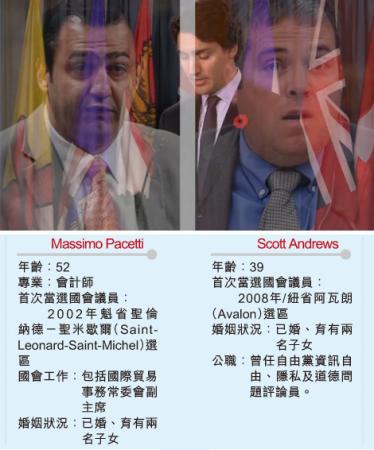联邦国会爆出怀疑性骚扰丑闻,两名自由党国会议员被指“严重行为不检”,昨被逐出国会自由党党团,怀疑事件涉及骚扰两名新民主党女议员。
自由党党魁Justin Trudeau表示,Scott Andrews和Massimo Pacetti犯下“严重行为不检”,已被逐出国会自由党党团,以及中止出任下届选举的候选人。他指国会要订立明确的指引和程序处理同类情况,并有责任保 护和鼓励任何人作出这种严重的指控。
Andrews和Pacetti否认指控,认为调查结果将会还他们清白。
小杜鲁多行动迅速
他指出,上月28日其中一名新民主党国会议员直接向他投诉,故他必须採取“公平和果断”的行动,鑑于受害人亲自投诉并不是件轻易的事,在平衡各方利益时,他将疑点利益归于投诉人。小杜鲁多今次行动异常迅速,相信原因与早前有人批评,CBC没有及早处理前电台主持戈迈斯(Jian Ghomeshi)的桃色丑闻有关。
Liberal Leader Justin Trudeau says Parliament needs clear guidelines on personal misconduct issues, after he suspended two MPs from caucus. Trudeau says Scott Andrews and Massimo Pacetti are denying allegations made by two NDP MPs.
自由党和新民主党不会公开两名投诉人的名字,也不会证实二人是否皆来自新民主党。不过,一名新民主党知情人士指,两名投诉人没想过小杜鲁多会公开事件,担心名字会被漏出。该名人士亦指,有关指控在一年前出现,小杜鲁多一直知道其中一宗投诉,但在国会议员要求下没有作出处理,直至上周党鞭Judy Foote和新民主党的Nycole Turmel向他反映事件。本周三,Foote向众议院议长希尔(Andrew Scheer)交待事件,建议展开独立调查。
新民主党党魁Thomas Mulcair称,对事件感非常难过,认为所有人都应享有免受骚扰的安全工作环境。Pacetti说,没有收到指控的详细资料,但愿意全力配合调查。
国会议员Dean Del Mastro被指违反选举法,自愿辞职。

另外,与保守党友好的马斯曹被指于2008年的竞选开支超出上限、没有呈报一笔21,000元的个人捐款,以及提交伪造文件。他指,辞职是为了避免尴尬和不想分化保守党。
Tories rejected recommendation on workplace harassment nine months ago
Sexual harassment on Parliament Hill was partly the subject of parliamentary study by a Commons committee just nine months ago.
By: Tonda MacCharles Ottawa Bureau reporter, Joanna Smith Ottawa Bureau reporter,
Published on Wed Nov 05 2014
OTTAWA—Sexual harassment on Parliament Hill — whether among politicians, staffers or media — has long been the subject of whispers or occasional rumours, but never has anyone come out into the marbled halls with direct allegations.
Yet it was partly the subject of parliamentary study by a Commons committee just nine months ago.
As part of a broader report, the committee issued a call on Status of Women Canada — a federal agency — to work with Parliament to raise “awareness of the issue of sexual harassment in the workplace.”
However, the Conservative government — through the two ministers responsible — rejected that specific recommendation.
The government’s response was posted in June: “We recognize the value of improving awareness of the issue of sexual harassment in the workplace among parliamentary staff, however this recommendation deals with matters that are within the responsibility of the Parliament of Canada and, as such, not within the purview of Ministers to address,” replied Treasury Board President Tony Clement and Kellie Leitch, who is the minister of Labour and the minister responsible for Status of Women Canada.
It was not the first such recommendation to be ignored.
In 2012 the Inter-Parliamentary Union, an international assembly whose participants included Canadian MPs, senators, and Commons Speaker Andrew Scheer adopted an action plan at a Quebec City meeting for “gender-sensitive parliaments.”
It specifically urged parliamentarians to develop anti-harassment and anti-discrimination policies “to ensure that all parliamentarians and parliamentary staff work in an environment free from all forms of discrimination and harassment, including sexual harassment.”
Beyond introducing a code of conduct that would penalize “language and behaviour that is considered sexist,” it said Parliament should “develop and implement anti-discrimination and anti-harassment policies in line with national legislation applicable to all parliamentarians and parliamentary staff including the establishment of an independent body to which complaints can be submitted and addressed.”
But no such independent body exists.
The House of Commons is now scrambling to figure out how to investigate and address “serious” but separate allegations that have arisen this week regarding “personal misconduct” by two Liberal MPs toward two New Democrat MPs.
New Democrat MP Niki Ashton, status of women critic for her party, says the lack of a sexual harassment policy like the one that would have come out of the report sends a signal to alleged victims that they should not come forward, because their complaints will not go anywhere.
“We need to be clear that in this environment in which we work, with its history of being male-dominated . . . we need to have policies that protect all of us, that make us all feel safe and welcome.”
That committee specifically made a recommendation regarding sexual harassment in the parliamentary workplace — an environment not subject to any of the usual Treasury Board policies that govern the government’s workplaces, and subject only to the decisions and policies of Parliament itself.
After months of hearings into the broader questions of policies in all federal departments and agency workplaces, the committee reported last February.
It noted there are three groups of federal employees “for whom normal policies and complaints procedures are either not accessible or not effective.”
Those included foreign staff in embassies, correctional services officers harassed by inmates, and staff of Members of Parliament. They are the employees of the individual MP hiring them, and are not covered by sexual harassment policies and processes available to staff of the House of Commons itself.
The report notes that Commons administration does offer orientation to new MPs, which includes their responsibilities as employers. But the report is silent on MPs who might become involved in a complaint of harassment themselves.
In the end, their report repeated much of what they heard and resulted in 14 recommendations to improve awareness of the issue among workers and managers, policies for dealing with reports by women who say they’ve been harassed, more alternate dispute resolution methods and better leadership training.
http://www.thestar.com/news/canada/2014/11/05/tories_rejected_recommenda...

